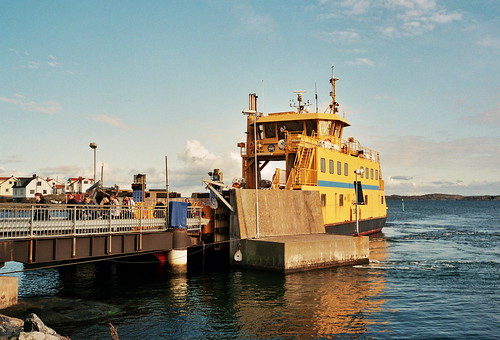
A friend of mine suggested that I watch a video, the main point of which was to demonstrate that the state was a leech on the body of the productive economy and that taxes should be cut to a bare minimum and the state cut down to size accordingly. It argued that public sector workers do not create wealth.It is a widespread view. Frankly, the video is not worth wasting the ten minutes it takes to watch it because the view it presents is a familiar part of the contemporary discourse. The Taxpayers' Alliance has been saying much the same thing, stridently.
It ignores that fact that without a stable civil society, no wealth could be created. Thus public sector workers are part of the wealth creation process. The state provides the infrastructure and security without which no wealth is created. Even the lollipop ladies mean people can got to work instead of having to take their children all the way to to school. The ferry in the picture runs day and night throughout the year, free to those who travel on it. Arguably, a charge should be made to go on it, but it could never make a profit and if it did not run, almost nobody could live or work on the island it serves. The expanding state reflects, in part, people’s expectations and on the whole they are not unreasonable ones but part of civilised life.
The video, like those who forward the point of view it was presenting, completely ignores the role of rent. It referred to a hypothetical restaurant owner, Roger, who was squeezed by the high taxes he was having to pay, such as the business rate. It did not mention how much rent Roger the restaurant owner was paying to his landlord, but it is well established that when the business rate is cut or abolished, rents rise to absorb all the benefit. The actual businesses gain nothing. It goes to the landlord. It should not be forgotten either, that mortgage interest is in reality rent. If one looks closely, it can be seen that something like 60% of the UK economy consists of what is actually rent, under one heading or another
The most valid argument made by the anti-state party is that “taxes on labour create unemployment and work is done abroad”. By this is meant that taxes have a "deadweight cost". But taxes on wages and production are not the only possible source of public revenue. A tax on the rental value of land has no deadweight cost. An ad valorem tax on the rental value of land would be taking out of that part of the private sector which does not create any wealth. It is the only tax of which this can be said. Other taxes, on tobacco and alcohol are imposed precisely because they have a deadweight cost.
The video went on to talk about how the private sector "creates jobs". Thus both "left" and "right" both subscribe to Job Creationist theory. Yet jobs are not “created” by anyone. Given the opportunity, people will find a way to work and provide themselves with livelihoods and become entrepreneurs. They should not have to wait for anyone, either in the private or public sector, to come along and give them a job. But work opportunities are hard to come by. Why? This is a question that does not receive the consideration it needs, not from either end of the political spectrum.
The idea that only the private sector creates wealth is misleading in another way also. Not all the private sector creates wealth. A large chunk of the private sector, including the so-called banking "industry", is merely sucking up land rental value. On the other hand, there is a fashion to lament the loss of industry. Some of this is due to the high taxation levied on labour and production, but to emphasise manufacturing is to ignore that fact that private sector service jobs are a valuable source of foreign exchange eg engineering consultancies, tourism, education, scientific research.
How big should it be?
Along with this view there is an idea that there is some optimal proportion of the economy that should be in the public sector, a figure of 30% being mentioned. However, there can be no magic figure for the optimum proportion of an economy that should be in the public sector. It might be no more than around 20%. But if one takes the view that the state has to stand aside and allow people to care for themselves, people must have the opportunity to do so. In what passes for a free market under what is confusingly described as the capitalist system, people are locked-out of work opportunities. What does this mean in practice? Look now at what the government spends taxpayers’ money on.
£ billion
Pensions 137
Health care 125
Education 29
Defence
43
Welfare
55
Police/Law
15
Transport
11
Interest
50
General
12
Other
60
Source UK public spending information
In round figures this is about £540 million. Of these, those in bold, and those only, are essential government functions. This amounts to about £160 billion. The remainder of the expenditure is on things which people could reasonably be expected, and would probably prefer, to provide for themselves, if they could afford it. They are transfer payments.
Thus more than two-thirds of government expenditure is not expenditure at all, it is for the relief of poverty ie compulsory state charity. Labour likes this because it makes people dependent. The Conservatives like it because it means that the most privileged classes can retain their privilege – it is just a matter of containing the poverty to acceptable limits. Those in the middle are becoming increasingly squeezed by this giant poverty-relief exercise.
What can one conclude from this? That neither those on the "Left" or the "Right" are seeing anything like the complete picture. One has to ask if they really want to.
Kommentarer